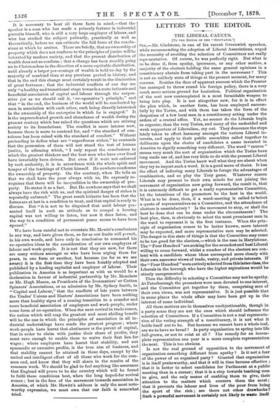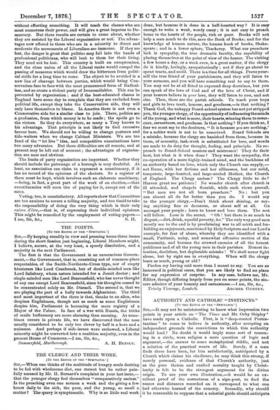LETTERS TO THE EDITOR
THE LIBERAL CAUCUS.
[TO THE EDITOR OF THE " SPECTATOR."]
SIR,-Mr. Gladstone, in one of his recent Greenwich speeches,. while recommending the adoption of Liberal Associations, urged the necessity of avoiding the selection of Committees not really representative. Of course, he was perfectly right. But what is to be done if, from apathy, ignorance, or any other motive, a majority of the electors holding the same general opinions in a constituency abstain from taking part in the movement ? This is not an unlikely state of things at the present moment, for many reasons. Besides the daze of apparent success which the Premier has managed to throw round his foreign policy, there is a very much more serious ground for hesitation. Political organisation of the sort now contemplated is a most formidable weapon to- bring into play. It is not altogether new, for it is in effect the plan which, in another form, has been employed success- fully by the Tories, and with them has taken the form of the- despotism of a few local men in a constituency acting under the orders of a central office. Yet, no sooner do the Liberals begin to organise, than the very Tories, and many of the undecided and weak supporters of Liberalism, cry out. They denounce the steps. lately taken to effect harmony amongst the various Liberal in- terests, and apply to their public assemblies called together to• deliberate upon the choice of candidates a name invented in America to signify something very different. The word " caucus means very much the sort of organisation which the Tories have long made use of, and has very little to do with the present Liberal movement. And the Tories know well what they are about when they try to import such a word. It is a good move of theirs. It has the effect of inducing many Liberals to forego the advantages of combination, and so play the Tory game. Whatever reason Liberals may present to their own minds for not joining the movement of organisation now going forward, the result is, that it is extremely difficult to get a really representative Committee, let the intentions of the promoters be the best in the world. What is to be done, then, if a ward-meeting is called tolelect a quota of representatives on a Committee, and the attendance of electors is unsatisfactory ? Is the movement to stop, or shall the best be done that can be done under the circumstances? The- best plan, then, is obviously to select the most prominent man in the ward to represent it in the first instance. When the prin- ciple of organisation comes to be better known, more interest may be expected, and more representative men may be selected. The danger in this state of things is that the Committee may come to be too good for the electors,—which is the case in Marylebone. The "Four Hundred " are seeking for the soundest and best Liberal willing to come forward, whilst a number of the electors are con- tent with a candidate whose ideas correspond more closely with their own narrower views of trade, vestry, and private interests. If the "Four Hundred "were entirely selected from this latter class, the Liberals in the borough who have the higher aspirations would be- utterly unrepresented.
Then the difficulty in selecting a Committee may not be apathy.. At Peterborough the promoters were men devoted to one interest,. and the Committee got together by them, comprising men of their own views, was not representative. It is just possible that in some places the whole affair may have been got up in the interest of some individual.
All these motives are in themselves unobjectionable, though in a party sense they are not the ones which should influence the selection of Committees. If a Committee is not a real representa- tion of the voting strength of a constituency, it is not what it holds itself out to be. But because we cannot have a whole loaf, are we to have no bread ? Is party organisation to spring into life full-grown, or not to exist at all ? The remedy for an incom- plete representation one year is a more complete representation the next. This is too obvious.
Is not the real ground of opposition to the movement of organisation something different from apathy ? Is it not a fear- of the power of an organised party ? Granted that organisation is in itself praiseworthy, and that it will in time become effective ; that it is better to select candidates for Parliament at a public meeting than in a corner; that it is a step towards teaching men. to give, and the only means of enabling them to give, their- attention to the matters which concern them the most ; that it prevents the labour and lives of the poor from being the sport of the rich ; are there not other drawbacks ? Such a powerful movement is certainly not likely to waste itself
without effecting something. It will teach the classes who are most numerous their power, and will give a great impetus to De- mocracy. But these results are certain to come about, whether they are assisted by the Liberal organisation or not: The advan- tages now offered to those who are in a minority to direct and moderate the movements of Liberalism are immense. If they are lost, the danger is great that politics may fall into the hands of professional politicians, who will look to them for their living. They need not be lost. This country is built on compromises, and the close union of all the Liberal ranks would compel the passing of measures which would draw the bitterness from politi- cal strife for a long time to come. The object to be avoided is a new line of cleavage between parties, which would bring Con- servatism face to face with the most pronounced form of Radical- ism, and so create a violent party of Irreconcilables. This can be prevented by organisation ; and if the best-educated classes in England have some day to complain that they are excluded from political life, except they take the Conservative side, they will only have themselves to blame. In America there is not even a Conservative side for a similar class to join. There, politics are a profession, from which money is to be made ; the spoils go to the victors. So they do everywhere, as many a Tory knows to his advantage. That principle is not likely to find excessive favour here. We should not be willing to change postmen and tide-waiters when we change Cabinet Ministers. We are too fond of the " let live " idea, and competitive examinations have 'too many advocates. But these difficulties are all remote, and at present may be left out of account ; the advantages of organisa- tion are near and obvious.
The limits of party organisation are important. Whether they should include the patronage of a borough is very doubtful. At least, no association can claim to represent a constituency, if it has no record of the opinions of the electors. So a register of them must be kept, which involves such an elaborate machinery, —being, in fact, a great part of the work of an election,—that constituencies will soon tire of paying for it, except out of the .rates.
Voting, too, is unsatisfactory. All reports show that Committees are too anxious to secure a telling majority, and too timid to take the responsibility of doing the very thing which is their only „raison d'etre,—that is, of expressing their individual opinions. This might be remedied by the employment of voting-papers.—







































 Previous page
Previous page